You’ve optimized your homepage, fine-tuned your service pages, and maybe even built out a few blogs for good measure. But there’s one page many business owners—and even some SEO professionals—often overlook: the About page.

Believe it or not, this single page can quietly power up your local visibility, enhance trust with your audience, and improve your overall rankings. If your About page is vague, outdated, or missing entirely, you might be missing out on real SEO potential.
In this post, we’ll explore why your About page matters so much for both local and general SEO, how to optimize it effectively, and the key mistakes to avoid. Let’s dive in.
What Is an About Page (and Why It Matters)
Your About page is more than just a digital business card. It tells the story of who you are, what you do, and why it matters. At a minimum, it should include:
- A brief company or personal background
- Your mission, values, and team bios
- Contact information and physical location
- Your history or origin story
But from an SEO perspective, it’s also a high-value opportunity to establish brand identity, build trust, and send consistent signals to both users and search engines.
Think of it as your website’s “trust center.”
A Quick Primer on Local SEO
Local SEO is all about helping your business show up in searches like “therapist near me” or “plumber in [Your City].” It prioritizes location-based signals that help search engines understand where you operate and who you serve.
Key local ranking factors include:
- Google Business Profile optimization
- NAP (Name, Address, Phone) consistency across the web
- Local reviews and citations
- Relevance of content to local search terms
Your About page can support all of these factors when it’s built with intention.
How an About Page Supports Local SEO
Reinforces NAP Consistency
Search engines want to see your business information (name, address, phone) consistently presented across your website and directory listings. Adding your full NAP details to your About page—formatted exactly as they appear on your Google Business Profile—strengthens this consistency and builds trust.
Bonus tip: Use schema markup (like “LocalBusiness” JSON-LD) to help Google easily parse that information.
Naturally Targets Local Keywords
By incorporating phrases like “serving the Grand Rapids area since 2012” or “based in Grand Rapids,” you help Google associate your brand with a specific location. These local cues can improve your visibility in geographic searches.
Builds Local Relevance and Authority
Your About page is the perfect place to mention local partnerships, sponsorships, or community involvement. These details not only tell your story—they also earn you “prominence” points in Google’s local algorithm, especially if they lead to local backlinks.
Enhances Local User Engagement
Simple calls-to-action like “Visit our office in downtown Asheville” or “Join our Grand Rapids community newsletter” encourage local visitors to interact more deeply, which can improve engagement metrics.
Supports Local Structured Data
Embedding a map or using LocalBusiness schema helps search engines clearly understand your physical location. This makes it easier to show up in local packs and map results.
How an About Page Supports Overall SEO
Enhances E-E-A-T (Experience, Expertise, Authoritativeness, Trust)
 Google looks for signals that demonstrate you’re a credible, trustworthy expert. Your About page can help by showcasing:
Google looks for signals that demonstrate you’re a credible, trustworthy expert. Your About page can help by showcasing:
- Founder or team bios with credentials
- Awards, certifications, or associations
- Stories of your business journey or client success
Improves Engagement Metrics
A well-written About page keeps users reading—and when visitors stay longer, it sends positive signals to Google. Add multimedia like team photos, a founder video, or a timeline to make the page even more engaging.
Supports Internal Linking
Use your About page to link to key service pages or blog content. This not only helps users navigate your site but also strengthens internal link equity.
Increases Visibility for Long-Tail & Branded Searches
People often Google things like “[Business Name] about” or “[Business Name] mission.” A well-optimized About page helps you capture those searches—and gives curious users a deeper reason to trust and engage with your brand.
Becomes a Backlink Magnet
Reporters, bloggers, and even potential partners often link to About pages when referencing your company. Make it easy for them by including a press-friendly section with highlights, images, or milestones.
Best Practices for an SEO-Friendly About Page
- Write for humans first. Keep it warm, clear, and authentic.
- Use your keywords wisely. Naturally include your business name, industry, and location.
- Optimize your metadata. Include local terms in your title tag and meta description.
- Add schema markup. Use “LocalBusiness” JSON-LD to boost structure.
- Include engaging visuals. Real team photos or a quick intro video go a long way.
- Make it mobile-friendly. Ensure it loads quickly and displays well on all screen sizes.
Common Pitfalls to Avoid
- Keyword stuffing. Overloading your page with cities or services feels unnatural and can hurt rankings.
- Being too generic. “We’re the best in the business” doesn’t cut it. Add real facts, dates, and credentials.
- Neglecting mobile users. Most local searches happen on phones—optimize for them.
- Failing to update. If your About page hasn’t changed in five years, it’s time for a refresh.
Measuring the Impact of Your About Page
Keep an eye on:
- Organic traffic to your About page (via Google Analytics)
- Branded/local keyword impressions (via Google Search Console)
- Time on page and bounce rate
- Click-throughs to conversion pages (like Contact or Services)
 Bonus tip: Set up GA4 events to track how users interact with your About page, such as clicking your address, phone number, or internal links.
Bonus tip: Set up GA4 events to track how users interact with your About page, such as clicking your address, phone number, or internal links.
Final Thoughts: Small Page, Big Opportunity
Your About page isn’t just a “nice-to-have.” It’s a powerful piece of your SEO puzzle—especially for local businesses. When optimized thoughtfully, it builds trust, reinforces local signals, and draws both humans and search engines deeper into your site.
If it’s been a while since you revisited your About page (or if you’ve never written one), now’s the time. Start small, keep it authentic, and let it grow with your business.
Start Improving Your Local SEO with Simplified SEO Consulting
At Simplified SEO Consulting, we specialize in helping mental health professionals and small business owners make every page on their site work harder. Reach out to learn how our team of SEO specialists can help you strengthen your SEO from the inside out. Take the first step toward an improved website:
- Apply to work with us: Fill out our quick application and tell us about your practice and your website concerns. (No worries if you’re not sure what’s wrong – that’s our job to find out!)
- Meet your SEO specialist: We’ll schedule a call to talk one-on-one.
- Start improving your website!
Other Services Offered with Simplified SEO Consulting
Simplified SEO knows there are many aspects of SEO that you may need help addressing to improve your private practice website. This is why we offer a variety of SEO services in addition to local SEO and technical SEO services. We also provide support through our Done For You SEO Services, DIY Online SEO Courses, and Consulting services. We also offer social media management, stand-alone copywriting services, and SEO strategy sessions. Visit our blog to learn more valuable SEO info today!
About the Author
 Sterling Humburg-Cage graduated from the University of Missouri with a BA in Psychology in 2020. He has integrated what he learned in school into his work as an SEO Specialist with Simplified SEO Consulting. Sterling prides himself on helping current clients & alumni problem-solve difficult issues. He’s great at giving clients multiple options about how to approach a situation, finding solutions to some of the more technical aspects of SEO, and responding in a timely manner to client concerns. Since he started, Sterling has met frequently with our alumni and provided them with extra problem-solving support. He now provides additional support with a variety of local SEO services. He often goes the extra mile to do outside research. By doing so, he ensures private practice owners have everything they need to rank well on search engines long term for the keywords their ideal clients are using!
Sterling Humburg-Cage graduated from the University of Missouri with a BA in Psychology in 2020. He has integrated what he learned in school into his work as an SEO Specialist with Simplified SEO Consulting. Sterling prides himself on helping current clients & alumni problem-solve difficult issues. He’s great at giving clients multiple options about how to approach a situation, finding solutions to some of the more technical aspects of SEO, and responding in a timely manner to client concerns. Since he started, Sterling has met frequently with our alumni and provided them with extra problem-solving support. He now provides additional support with a variety of local SEO services. He often goes the extra mile to do outside research. By doing so, he ensures private practice owners have everything they need to rank well on search engines long term for the keywords their ideal clients are using!

 Mobile technical SEO means making sure your website’s underlying code and setup work well on phones and tablets. In other words, it’s the behind-the-scenes work that helps search engines find, understand, and index your site,
Mobile technical SEO means making sure your website’s underlying code and setup work well on phones and tablets. In other words, it’s the behind-the-scenes work that helps search engines find, understand, and index your site, 
 If this feels overwhelming, remember you can get help. Consider hiring a technical SEO expert or agency to run a full site audit. Many SEO consultants offer a
If this feels overwhelming, remember you can get help. Consider hiring a technical SEO expert or agency to run a full site audit. Many SEO consultants offer a  At its core, it’s a way of organizing information on your website so search engines can make sense of it. Think of it like tagging your content with labels that tell search engines, “Hey, this is a service I offer,” or “This is a special discount going on for a product I sell.” By doing this, you’re giving search engines the tools they need to show your site in cool, interactive ways. Some of these may include featured search results, star ratings, recipe cards, or event listings you’ve probably seen on Google. The best part? When search engines understand your site better, your content is more likely to get noticed, leading to richer search results and better click-through rates. It’s a win-win for both you and your audience. However, depending on what your website offers, certain types of schema may not be as useful as others.
At its core, it’s a way of organizing information on your website so search engines can make sense of it. Think of it like tagging your content with labels that tell search engines, “Hey, this is a service I offer,” or “This is a special discount going on for a product I sell.” By doing this, you’re giving search engines the tools they need to show your site in cool, interactive ways. Some of these may include featured search results, star ratings, recipe cards, or event listings you’ve probably seen on Google. The best part? When search engines understand your site better, your content is more likely to get noticed, leading to richer search results and better click-through rates. It’s a win-win for both you and your audience. However, depending on what your website offers, certain types of schema may not be as useful as others.  For example, in the past, Google focused on providing users with answers through things like guides and “How To” resources. As a result, they created “HowTo” schema to make following step-by-step guides easier. But, as Google has phased out the rich results for this type of schema, new forms have taken its place. This may include new forms of schema for voice search and “zero-click” search results, or other schema types that accommodate conversational queries that have gained importance. Additionally, unique needs—like the introduction of COVID-19 schema to share timely updates—drive the development of new options. Staying current with these changes ensures your site stays competitive and relevant in search results.
For example, in the past, Google focused on providing users with answers through things like guides and “How To” resources. As a result, they created “HowTo” schema to make following step-by-step guides easier. But, as Google has phased out the rich results for this type of schema, new forms have taken its place. This may include new forms of schema for voice search and “zero-click” search results, or other schema types that accommodate conversational queries that have gained importance. Additionally, unique needs—like the introduction of COVID-19 schema to share timely updates—drive the development of new options. Staying current with these changes ensures your site stays competitive and relevant in search results. However, its effectiveness hinges on staying updated with new developments and evolving strategies as search technologies advance. By regularly auditing and refining schema implementations, you can ensure your site remains competitive and engaging. Take action today: review your current schema setup, explore new schema opportunities, and stay informed about best practices to keep your website future-ready.
However, its effectiveness hinges on staying updated with new developments and evolving strategies as search technologies advance. By regularly auditing and refining schema implementations, you can ensure your site remains competitive and engaging. Take action today: review your current schema setup, explore new schema opportunities, and stay informed about best practices to keep your website future-ready. Technical SEO can be thought of as the processes one takes to ensure that a site has the technical needs to help improve
Technical SEO can be thought of as the processes one takes to ensure that a site has the technical needs to help improve  Mobile optimization is crucial for SEO because a significant portion of web traffic now comes from mobile devices like cell phones and tablets. A mobile-friendly design ensures that users have a smooth and enjoyable experience on smaller screens, which can reduce bounce rates and increase engagement. Implementing AMP (Accelerated Mobile Pages) can enhance this experience even more by enabling faster load times. Optimizing for mobile devices improves search rankings and helps reach a broader audience more effectively.
Mobile optimization is crucial for SEO because a significant portion of web traffic now comes from mobile devices like cell phones and tablets. A mobile-friendly design ensures that users have a smooth and enjoyable experience on smaller screens, which can reduce bounce rates and increase engagement. Implementing AMP (Accelerated Mobile Pages) can enhance this experience even more by enabling faster load times. Optimizing for mobile devices improves search rankings and helps reach a broader audience more effectively. For global websites, international SEO is crucial, involving the use of hreflang tags to indicate language and regional targeting. This ensures that users are directed to the right version of a page based on their language and location. By doing so, this can improve user experience and search visibility in different markets.
For global websites, international SEO is crucial, involving the use of hreflang tags to indicate language and regional targeting. This ensures that users are directed to the right version of a page based on their language and location. By doing so, this can improve user experience and search visibility in different markets.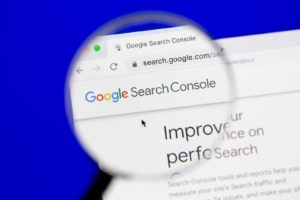 In most cases, you will likely want to start with Google’s own tool to try and index your pages.
In most cases, you will likely want to start with Google’s own tool to try and index your pages.  It’s important to ensure pages have been indexed. But, doing this for each individual page can be difficult for Google to keep track of. This is why we suggest submitting your sitemap to Google Search Console in order to better help Google what pages to expect from your site. A sitemap helps provide
It’s important to ensure pages have been indexed. But, doing this for each individual page can be difficult for Google to keep track of. This is why we suggest submitting your sitemap to Google Search Console in order to better help Google what pages to expect from your site. A sitemap helps provide Some of the most common issues one may encounter when trying to index their pages come from pages having special indicators that tell Google not to index the page. This is often referred to as a “no index” tag. Sometimes these can happen in error. But, in other cases, it can be helpful to avoid including certain pages on your site that aren’t important from an analytics standpoint. Some examples of pages that may not be indexed include:
Some of the most common issues one may encounter when trying to index their pages come from pages having special indicators that tell Google not to index the page. This is often referred to as a “no index” tag. Sometimes these can happen in error. But, in other cases, it can be helpful to avoid including certain pages on your site that aren’t important from an analytics standpoint. Some examples of pages that may not be indexed include:




 Emails like this are common, so you may get them before you have done any SEO. A large number of these are often
Emails like this are common, so you may get them before you have done any SEO. A large number of these are often  So you’ve received an email telling you what is wrong with your SEO. It’s best to ignore it, right? In most cases, yes. But, you can still use this as a chance to reflect on what elements of your SEO strategy are contributing to your
So you’ve received an email telling you what is wrong with your SEO. It’s best to ignore it, right? In most cases, yes. But, you can still use this as a chance to reflect on what elements of your SEO strategy are contributing to your  Messages may include references to how low your rankings are and how they can support you to improve them. Emails may seem more urgent and warn of something you’re doing wrong. For example, you may receive an email that tells you how your SEO is suffering due to not having enough backlinks. In an event like this, they may suggest that you purchase links through them in order to help improve your SEO. However, the links you would likely receive from something like this are more than likely going to be scammy, and not the high-quality links that will help your practice. In a case like this, it is actually seen as an
Messages may include references to how low your rankings are and how they can support you to improve them. Emails may seem more urgent and warn of something you’re doing wrong. For example, you may receive an email that tells you how your SEO is suffering due to not having enough backlinks. In an event like this, they may suggest that you purchase links through them in order to help improve your SEO. However, the links you would likely receive from something like this are more than likely going to be scammy, and not the high-quality links that will help your practice. In a case like this, it is actually seen as an 
 Even though this tool is helpful and can be used to make a difference, it has some limitations. This is likely why they also offer SEO services as part of one of their packages. It is without saying that at Simplified SEO Consulting, we recommend hiring us if you need Search Engine Optimization services for your private practice. This is because we help mental health professionals focus on the clients they want to attract. In contrast, GoDaddy provides services in a generic manner that primarily targets getting website views rather than booking clients.
Even though this tool is helpful and can be used to make a difference, it has some limitations. This is likely why they also offer SEO services as part of one of their packages. It is without saying that at Simplified SEO Consulting, we recommend hiring us if you need Search Engine Optimization services for your private practice. This is because we help mental health professionals focus on the clients they want to attract. In contrast, GoDaddy provides services in a generic manner that primarily targets getting website views rather than booking clients. The Summary:
The Summary:
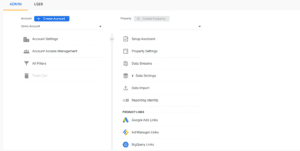
 When connecting Google Analytics to a WordPress site, you will need to access the backend of your private practice website and navigate to the Tools section of the navigation bar on the left side of your screen.
When connecting Google Analytics to a WordPress site, you will need to access the backend of your private practice website and navigate to the Tools section of the navigation bar on the left side of your screen.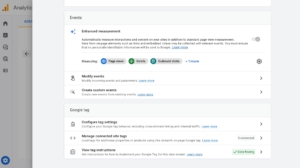 If you decide to manually add this code to your WordPress site, you will need to navigate the backend of your site once again. Once here, you need to add the copied code to the header section on each page of your site. But, WordPress doesn’t automatically allow you to edit the header code of your site. Due to this, you will likely need to install a plugin that will allow you to make these additions. Thankfully, regardless of your choice of plugin, you will often find access to your site’s header code in the Theme settings of the website builder. Please ensure you are familiar with your site and the plugin you are using if you decide to manually add the necessary code since errors in the code of your site can have a wide variety of ramifications.
If you decide to manually add this code to your WordPress site, you will need to navigate the backend of your site once again. Once here, you need to add the copied code to the header section on each page of your site. But, WordPress doesn’t automatically allow you to edit the header code of your site. Due to this, you will likely need to install a plugin that will allow you to make these additions. Thankfully, regardless of your choice of plugin, you will often find access to your site’s header code in the Theme settings of the website builder. Please ensure you are familiar with your site and the plugin you are using if you decide to manually add the necessary code since errors in the code of your site can have a wide variety of ramifications. 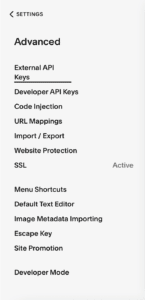 For Squarespace users, the process for connecting to Google Analytics is fairly straightforward! Once you have your measurement ID, you will need to access the back end of your private practice website. Once on your home screen, click Settings, then Advanced. Click on External API Keys from here, and paste your measurement ID in the Google Analytics section.
For Squarespace users, the process for connecting to Google Analytics is fairly straightforward! Once you have your measurement ID, you will need to access the back end of your private practice website. Once on your home screen, click Settings, then Advanced. Click on External API Keys from here, and paste your measurement ID in the Google Analytics section. 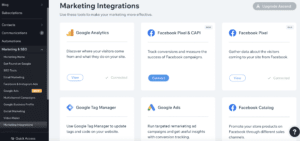

 For service pages, the meta descriptions highlight that specific therapy technique or service page that you offer.
For service pages, the meta descriptions highlight that specific therapy technique or service page that you offer.  Other Things To Consider
Other Things To Consider About The Author
About The Author